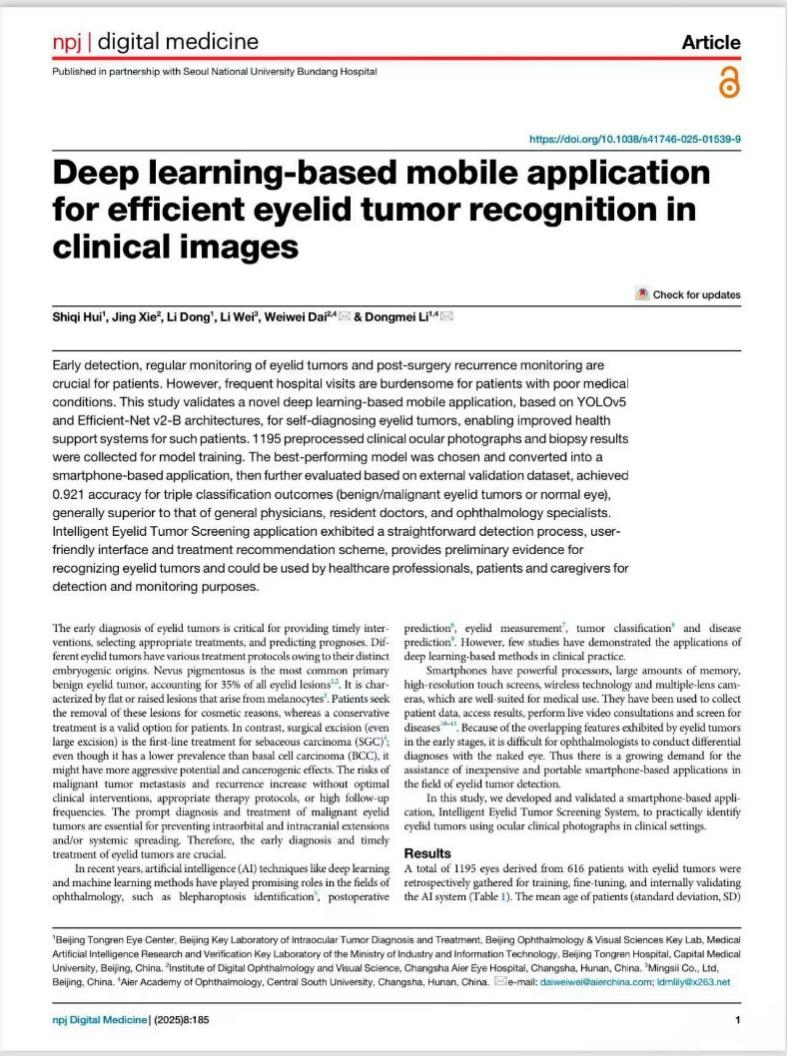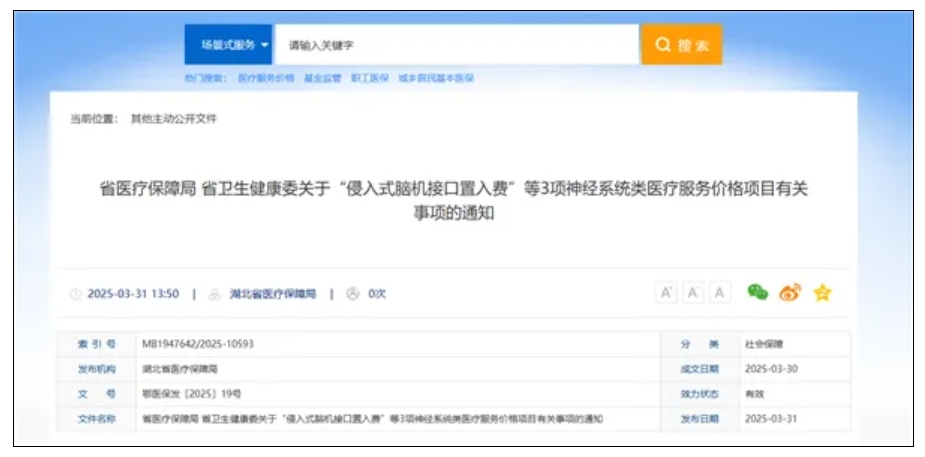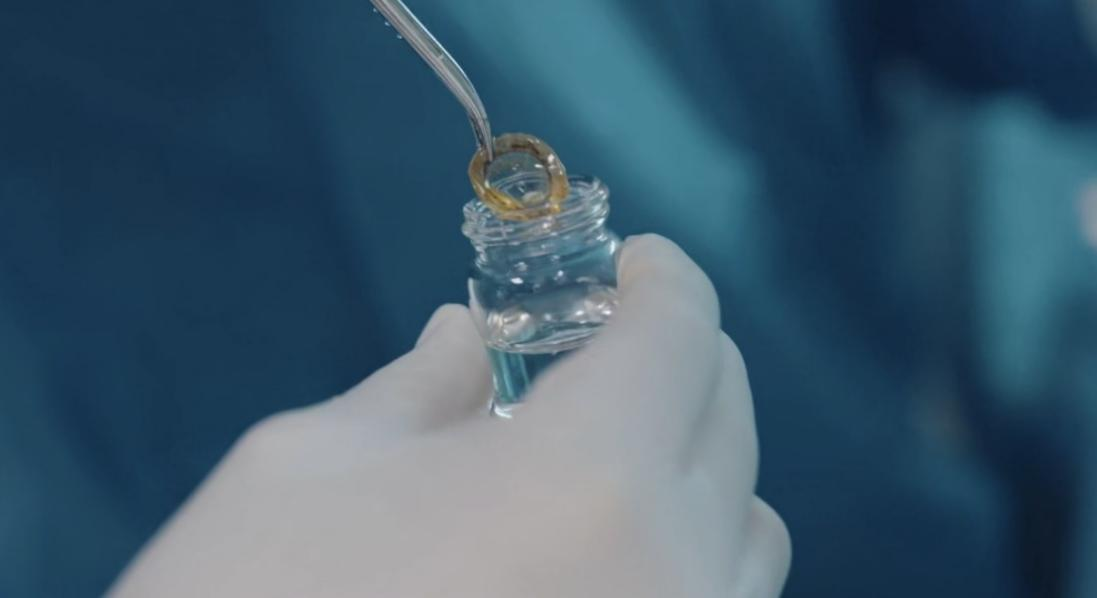最近 ,英国癌症研究中心发现了一个名为FOXC1的基因,该基因会导致癌症不断恶化,尤其是对于急性髓系白血病(AML)患者,该项研究发表在《癌症细胞》杂志上。
FOXC1基因通常是存在于一些特定的转换过程中,比如胚胎发育,或者是细胞转换成眼睛、肾脏、大脑和骨骼等特定组织。
但新的研究表明,FOXC1对于急性髓系白血病(AML)患者却是一个错误的存在,因为它错误地打开了病人肿瘤细胞的“开关”,从而加速了患者病情的恶化。
FOXC1是如何加速性髓系白血病(AML)患者病情的?FOXC1在不断发展血细胞的同时,阻止它们成长为人体所需的正常血细胞,这导致了癌细胞更具攻击性,因为年轻细胞能够复制成熟细胞,导致癌细胞生长更快,病情难以遏制,加深治疗的难度。
在英国,每年有2900人被诊断为急性髓系白血病(AML),其中有20%的患者是被FOXC1基因错误地开启了癌细胞。
英国癌症研究中心的蒂姆博士说:“这是一个重要的发现,有助于我们对急性髓系白血病的展开更深入的研究,为什么会患上急性髓系白血病,不是因为基因出现了突变或者缺陷,而是因为基因在错误的时间被错误的打开,从而加速了癌细胞的生长速度。FOXC1基因具有两面性,一方面,特定组织的转换过程需要它,而另一方面,当它被错误地打开,却导致了急性髓系白血病的发生。”
研究中心高级科学传播经理内尔巴里表示:“我们必须继续进一步了解细胞癌变的生物学基础,在这项研究中,确定一个特定的基因在侵袭急性髓系白血病,这将为我们寻找新的治疗方法能提供线索,从而有助于为患者进行个性化治疗。”
原文:
Scientists have identified a gene - FOXC1 - that, if switched on, causes more aggressive cancer in a fifth of acute myeloid leukaemia (AML) patients, according to a Cancer Research UK study published in the journal Cancer Cell, today.
The FOXC1 gene is normally switched on during embryonic development and is needed to turn cells into specialised tissues, like the eyes, kidney, brain and bone.
But this new research found that in certain patients with AML - a type of blood cancer that affects white blood cells and the bone marrow - this gene was wrongly switched on inside the patient's cancer cells.
When it is switched on in blood cell tissue, FOXC1 stunts the development of blood cells and stops them maturing into normal specialised blood cells.
This triggers the cancer to be more aggressive, as young cells are able to replicate more than mature cells - causing cancer cells to grow faster and become more difficult to treat.
Around 2,900 people are diagnosed with AML each year in the UK. Of these, around 20 per cent would have had the FOXC1 gene wrongly switched on in their cancer.
Dr Tim Somervaille, lead author from the Cancer Research UK Manchester Institute at The University of Manchester, said: “This is an important finding which helps us understand how acute myeloid leukaemia develops and why some cases of AML are more aggressive than others. Here, instead of being faulty or mutated, this normal gene is turned on in the wrong place at the wrong time which makes the cancer grow more rapidly.”
“There are certain situations where this gene is necessary, as in the development of the eye and skeleton before birth. But when it's switched on in the wrong tissue, it causes more aggressive forms of leukaemia.“Nell Barrie, senior science communication manager at Cancer Research UK, said: ”It's essential that we continue to research basic biology to further understand how cells become cancerous. In this study, identifying a specific gene behind more aggressive forms of acute myeloid leukaemia could give clues for new ways to personalise treatments for select patients. The better we understand the nuts and bolts of each cancer, the sooner we can find new ways to stop it.”
来源:医谷网 作者:译 史士云
为你推荐
 资讯
资讯 悦唯医疗完成近亿元A++轮投资,加速重症冠心病诊疗全流程创新器械研发与国产替代
此次融资将主要用于深化冠心病诊疗全流程创新器械和脉动式左心室辅助系统等新产品的研发,以及加速已获准上市的心脏稳定器等产品的市场推广。
2025-04-03 09:28
 资讯
资讯 海尔盈康一生启动孤独症儿童关爱行动,创新罕见病可持续公益新生态
本次活动聚焦孤独症儿童的诊疗,探讨交流AI赋能全流程防治康体系创新、前沿性生物科技诊疗技术等话题,旨在通过生态联盟的力量推动医学研究、科技创新与人文关怀的融合,让“星...
2025-04-03 09:11
 资讯
资讯 《NPJ digital medicine》刊发李冬梅教授团队成果:AI赋能高效识别眼睑肿物
亚太眼整形外科学会主席、中华医学会眼科分会眼整形眼眶病学组副组长李冬梅教授团队携手爱尔数字眼科研究所,在《NPJ digital medicine》(影响因子:12 4)学术期刊发表团队...
文/李林 2025-04-02 10:27
 资讯
资讯 默克全球执行副总裁周虹:合作与创新是默克未来五年战略的两大关键词
近日,德国默克医药健康全球执行副总裁、中国及国际市场负责人周虹带领医药健康中国及国际市场管理团队开启了2025年度首次“中国行”。
2025-04-01 17:11
 资讯
资讯 首个且唯一,阿斯利康PD-L1单抗获FDA批准治疗肌层浸润性膀胱癌
度伐利尤单抗联合吉西他滨和顺铂作为新辅助治疗,随后度伐利尤单抗作为根治性膀胱切除术后的辅助单药治疗,用于治疗肌层浸润性膀胱癌成年患者。
2025-04-01 14:37
 资讯
资讯 全国首个,湖北为脑机接口医疗服务定价
昨日(3月31日),据“湖北发布”消息,湖北省医保局发布全国首个脑机接口医疗服务价格,其中,侵入式脑机接口置入费6552元 次,侵入式脑机接口取出费3139元 次,非侵入式脑机...
2025-04-01 11:03
 资讯
资讯 一款国产创新流感药,获批
近日,据国家药监局官网信息显示,青峰医药下属子公司江西科睿药自主研发的1类创新药玛舒拉沙韦片(商品名:伊速达)正式获批上市,用于既往健康的12岁及以上青少年和成人单纯性...
2025-04-01 10:22
 资讯
资讯 26省联盟药品集采启动,聚焦妇科用药和造影剂
近日,山西省药械集中招标采购中心发布《关于做好二十六省联盟药品集中带量采购品种数据填报工作的通知》,开展相关采购数据填报工作。
2025-03-31 21:48
 资讯
资讯 优时比罗泽利昔珠单抗注射液(优迪革)中国获批,全球首个且唯一双亚型创新药治疗全身型重症肌无力
作为唯一人源化、高亲和力且具备创新修饰结构的IgG4单抗,关键Ⅲ期MycarinG试验证实罗泽利昔珠单抗注射液(优迪革®)较安慰剂显著改善全身型重症肌无力患者的多个临床终点与结局。
2025-03-31 15:58
 资讯
资讯 从手术麻醉到生命全周期护航,麻醉学科发展拓宽生命边界
3月26日,由中华医学会麻醉学分会、中国医师协会麻醉学医师分会等23家学协会共同举办的2025年中国麻醉周学术活动的启动仪式举办,该活动以“生命之重,大医精诚——守生命保驾护...
2025-03-31 15:30
 资讯
资讯 欧狄沃联合逸沃成为中国目前唯一获批的肝细胞癌一线双免疫联合疗法
欧狄沃联合逸沃对比仑伐替尼或索拉非尼,可显著改善不可切除肝细胞癌一线患者的总生存期(OS),客观缓解率(ORR)可改善近3倍,中位缓解持续时间(mDOR)达30个月
2025-03-31 13:45
 资讯
资讯 罗氏制药榜首 “现金牛” 产品罗可适(奥瑞利珠单抗)在华获批:开启多发性硬化症一年两次治疗新时代
罗氏制药今日(3月31日)宣布,其旗下创新药罗可适®(Ocrevus®,通用名:奥瑞利珠单抗注射液 ocrelizumab injection)正式获得中国国家药品监督管理局批准,每六个月静脉输...
2025-03-31 13:39
 资讯
资讯 三生有幸,医者仁心:三生制药向全体医药工作者致敬!
3月30日是国际医师节,由三生制药公益支持的以“三生有幸,医者仁心”为主题的公益活动,携手20位医生代表,以寄语海报的形式,共同向全体医护人员表达诚挚的祝福与关爱。
2025-03-30 17:38
 资讯
资讯 新版药典自2025年10月1日起实施
3月25日,国家药监局官网发布《国家药监局 国家卫生健康委关于颁布2025年版的公告(2025年第29号)》,2025年版《中国药典》自2025年10月1日起施行。
2025-03-30 17:07







